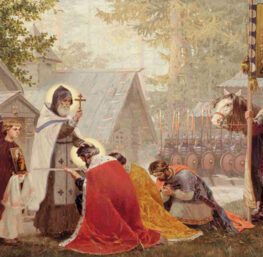 by Andrew M. Greenwell, Esq. –
by Andrew M. Greenwell, Esq. –
In his book City of God, St. Augustine famously said, “without justice, what else is the State but a great band of robbers?” This statement seems to be a favorite of Pope Benedict XVI, and he has recruited it in warning lawmakers, particularly lawmakers in the Western nations with Christian heritage, of the way to which they are headed.
He referred to these words in his address to the German Parliament or Bundestag when he visited Germany. Some years earlier, in his encyclical Deus caritas est, Pope Benedict XVI referred to those very same words.
It is useful from time to time to recall these words of St. Augustine and the deep truth that they convey.
In his encyclical Deus caritas est, Pope Benedict elaborated on St. Augustine’s famous saying. The reason why St. Augustine insisted on justice is that “justice is both the aim and the intrinsic criterion of all politics.” (No. 28).
The negative implication of this statement is that without justice, politics–and the law promulgated by the political processs–is aimless and has no criterion. In short, it is lawless, and being lawless, unjust.
To say that politics and law are aimless and have no criterion, is the same thing as saying that politics and law are unreasonable and arbitrary. All politics and all law therefore become relative and unhinged from moral law. This view of politics and law takes us from freedom–which is the liberty to do as we ought–past the threshold of justice into tyranny–where we are no longer free to do as we ought, but we must do what we’re told.
By definition, tyranny exists when politics or law is arbitrary. In such a case, might makes right, whereas it ought to be the other way around: right–that is to say, justice–makes might.
Politics and law must then be informed by right, by justice. It is an absolutely essential requirement that politics and law have justice behind them, otherwise we are ruled by thug government.
In politics, as in lawmaking, it is essential to focus on justice.
Justice, as the Compendium of the Social Doctrine of the Church makes clear, has both subjective and objective components.
But we ought not to be confused by the term “subjective.” The term “subjective” does not mean whatever we want, or feel, or desire (which is how we ordinarily use the term). In saying that justice has a subjective component, the Church is hardly advocating a politics of desire.
The term subjective as understood by the Church within the context of justice means that we ought to have the firm and constant resolve “to recognize the other as a person.” (Compendium, No. 201) In other words, the term subjective in the context of justice (and politics and law) means not the I, not the ego, but rather the other, the you, the su, the tu.
(It is indicative of the self-focused, individualistic nature of our society that the 1st person singular personal pronoun “I”-in Greek and Latin ego-has become a common word in English, but the 2nd person singular personal pronoun “you”-in Greek, su, in Latin, tu-is never heard at all. The word egoism is common; the word tuism is used only by grammarians, and not modern jurists. But egoism has nothing to do with justice; tuism has everything to do with justice. The only word we have is “altruism” which is derived from the word alter or “other,” but that has a sense of the anonymous or generic other, and not the familiar su or tu.)
Not only then is justice entirely other directed, it is also based upon objective moral reality, the moral what is. Therefore, justice must include “decisive criteria of morality in the intersubjective and social sphere.” (Compendium, No. 201)
The “decisive criteria of morality” are found in the natural moral law. The natural moral law has some “unchanging moral truths” from which we derive our inalienable rights, such as those relating to life, liberty, and the pursuit of happiness. No politics, no law can ever trespass these without rank injustice.
As the Pope in January of this year told the American bishops in their ad limina visit to Rome, the reality of these “unchanging moral truths” is the “key to human happiness and social prospering.” To ignore them, to supplant them, to violate them is not liberty, not justice, but rather its opposite: for it is to build a society and a politics based upon “reductionist and totalitarian readings of the human person and the nature of society.” This necessarily leads to injustice.
In short, justice means the firm and constant resolve to recognize the other as a person, and to give him his due, all within the constraints of the natural moral law.
To the extent any government fails to recognize anyone as a person-such as happened in our former laws allowing human chattel slavery which were abrogated by the 13th and 14th Amendments after a sanguinary war-it is nothing but a band of robbers, because the politics and law in not recognizing a person as a person has failed in its aim and criterion of subjective justice.
Likewise, to the extent any government that trespasses the natural law-such as is happening now by the legal protection given abortion, or the legal recognition given homosexual “marriage”-it is nothing but a band of robbers because it has forgotten the aim and criterion of politics objective justice.
What all of this means, of course, is that St. Augustine and Pope Benedict XVI are telling us that justice is outside politics and outside human law. Something that is politically or legally expedient–even if it is the will of the majority–is not necessarily just. Justice is something that hovers outside or above politics and law, that is extra-political or extra-legal or, perhaps better, supra-political or supra-legal. Politics and law that are based upon nothing other than agreement is rudderless politics, rudderless law, and it quickly falls into something gravely evil.
As Catholics–indeed, all humans of good will regardless of religious confession–we must not cooperate in any effort to remove an objective aim and criterion of politics and of law. To do so would, in the words of Cardinal Ratzinger at the Mass prior to his election as Pope, be “building a dictatorship of relativism that does not recognize anything as definitive and whose ultimate goal consists solely of one’s own ego and desires.”
Justice cannot be guilt on egoism, which is what the secularists wish to do. It must be built on tuism and the natural moral law. Anything less is to be ruled by a band of robbers.
The American Jesuit John Courtney Murray stated that accepting a secularistic notion of democracy-such as what is proposed by many modern political philosophies including the regnant one-would result in the dismantling of the “noble, many storied mansion of democracy,” and would level it “to the dimensions of a flat majoritarianism, which is no mansion but a barn, perhaps even a tool shed in which the weapons of tyranny may be formed.”
If we allow ourselves to be ruled by a politics without justice, a politics that does not recognize the rights of persons and the natural law, then we will be ruled by a band of robbers, and we invariably will turn our “noble, many storied mansion of democracy” into a tool shed where the robbers pound out the weapons of their tyranny-laws of inhuman steel.
We will live in a toolshed, subject to thiefdom.
HT: Catholic Online




Justice must be an integral part of our society, in order to ensure that we are not overcome by a political state that is ruled by a band of robbers.
Justice and natural law allow the people in our society to enjoy certain rights — such as life and liberty — which we would not be able to enjoy in a political state with its pro-tyrrany laws and totalitarian rule.